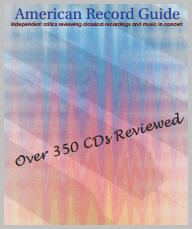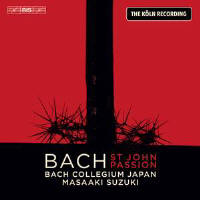Texte paru dans: / Appeared in: |
|
|
Outil de traduction ~ (Très approximatif) |
|
|
Reviewer: William
J. Gatens
This recording owes its
existence to the COVID-19 pandemic. In March of 2020 the singers and players
of Bach Collegium Japan were embarked on a European tour of 11 concerts in
six countries to celebrate their 30th anniversary. Arriving in
Cologne after 3 concerts, they were informed that the remaining 8 had been
cancelled owing to the coronavirus. The intendant of the Cologne
Philharmonie made an offer for them to give a live-streamed performance of
the St John Passion at the time the concert had been scheduled, but the
cancellation of the other concerts left the artists with time on their
hands. At this point, Masaaki Suzuki’s wife Tamaki, who sings in the choir,
suggested that they make a recording. BIS records gave the go-ahead, and
there was considerable scrambling to assemble a producer, crew, and
recording equipment. The intendant offered the use of the main hall of the
Philharmonie free of charge, and for four days the recording sessions
proceeded. As they were approaching the end of the project, the police
arrived with orders that the building be vacated immediately and closed. As
it happened, one of the policemen had heard the live-streamed performance
and allowed the musicians and crew an hour to complete their work. The
result is the present recording.
I am not convinced by Suzuki’s
treatment of the chorales. In an essay published in the booklet with this
recording, Bach scholar Robin Leaver likens the chorales to “the pillars of
a gothic church building” that hold up the arches and vaults of the
narration, dialogs, and devotional arias and ariosos. I believe that this
function demands that the chorales be treated with a deliberate and solemn
formality. If the tempo is too brisk and the treatment too subjective this
function is defeated, or at least badly compromised, as is sometimes the
case here. Another element of this recording that I find annoying is the
harpsichord continuo. It seems too obtrusive and busy when it should be
supportive and even self-effacing. I made a similar complaint about the 1998
recording. | |
|
|
|
|
Cliquez l'un ou l'autre
bouton pour découvrir bien d'autres critiques de CD |
|




